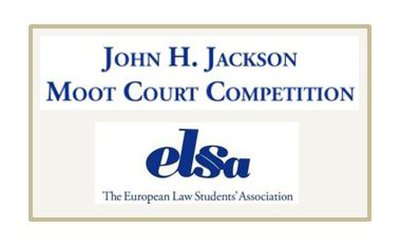1 Jan 2019
17th Edition of the John H. Jackson Moot Court Competition
The 2019 JHJMCC (formerly EMC2) is based on a fictional case co-written by Rodrigo Polanco Lazo and MILE alumna Maria Corvaglia. Three current TRAIL+ students and one student from the University of Bern's Faculty of Law will participate in this year's competition.
What is the JHJMCC?
The JHJMCC is a simulated hearing of the WTO dispute settlement system. Teams of 2-4 participants prepare and analyze a fictitious case and then present arguments as both the Complainant and the Respondent in front of a Panel consisting of WTO and trade law experts.
The case for the 17th Edition of the popular competition was co-written by the WTI’s Rodrigo Polanco Lazo and MILE 9 alumna Maria Corvaglia. The full text of the case can be found via the link below.
Interested in competing? While applications are no longer being accepted for the 17th Edition (2019) JHJMCC, it is never too early to learn about the competition and prepare yourself for the 2020 intake of submissions. The information below gives you a general outline of the steps of the competition, and is taken directly from the official John H. Jackson Moot Court Competition website. Visit the official website for more details:
Step 1: Written Submissions
Teams prepare Written Submissions for both the Complainant and Respondent of a fictitious case.
Interested students from all over the world are sending in their written memorandum based on a fictitious case. Registered teams have to send one Written Submission for the Complainant and one Written Submission for the Respondent (two separate Written Submissions in total). Each Submission shall not exceed 30 pages, not including the cover page. Regardless the fact, whether a team is preparing to compete in the International Written Round or they are sending their Written Submissions for scoring before the Regional Round, it is of a crucial importance to bear in mind the role of the Written Submissions in the whole competition. In the preliminary rounds the teams will be ranked according to the total score of their oral pleadings (70 %) and on the evaluations of their Written Submissions (30%).
Step 2: Regional Rounds
(Regional Rounds) are composed of 6 elimination rounds. They are taking place all over the world: an All-American Round, two Asia-Pacific Rounds, two European Rounds and an African Round.
Afterwards, all the teams will have the opportunity to present their oral submissions both for the Complainant and the Respondent in front of a Panel at the Regional Round. The Panel consists of WTO professionals and trade law experts. The John H. Jackson Moot Court Competition is made up of two European Regional Rounds, a Regional Round for Asia-Pacific, an All American Regional Round and one Regional Round for Africa. The Regional Rounds shall have at least three stages: Preliminary Rounds, Semi-Finals and the Grand Final.
Step 3: Final Oral Round
The best 20 teams from all over the world are qualified to participate in the Final Oral Round that takes place at the WTO Headquarters in Geneva, Switzerland.
The 17th edition’s Final Oral Round will take place from 4-8 June 2019 in Geneva, Switzerland.
The WTI is proud to be an Academic Sponsor of the JHJMCC. Winning teams of the Regional Rounds and Final Oral Round receive a full scholarship to the WTI’s Winter or Summer Academy. The prize for the Best Oralist in the Final Oral Round is a full tuition scholarship for the WTI’s TRAIL+ (LL.M.) programme.
Further info
John H. Jackson Moot Court Competition official site
JHJMCC Structure and Dates
17th Edition (2019) Case
Rodrigo Polanco
MILE 09, Maria Anna Corvaglia


